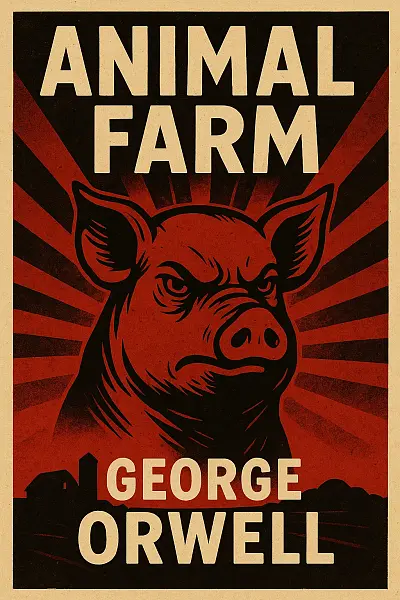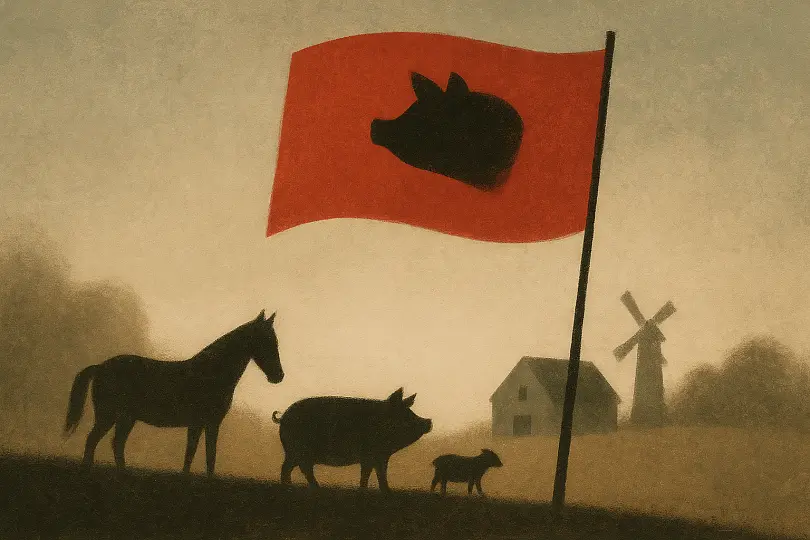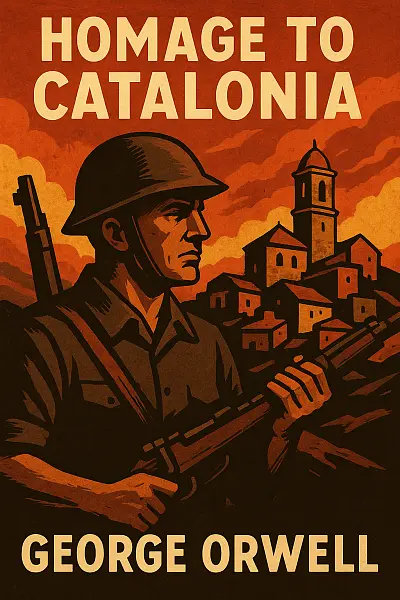
Animal Farm
by: George Orwell
On Manor Farm, a ragtag group of animals, led by the clever pigs, endures brutal treatment under farmer Jones. Tired of the cruelty, they unite and revolt, dreaming of a fair society built on equality and hope. As the animals celebrate their newfound freedom, the pigs rise to leadership, promising a just world—but power begins to shift in unsettling ways. Tension grows as ideals clash with ambition, and everyone wonders if true equality is even possible.
Orwell spins this fable with biting wit and a darkly playful edge, drawing us right up to that gut-punch moment: will the animals' dreams survive, or will history repeat itself?
"When power wears the mask of equality, the truth is often locked in the stable and forgotten."
Let's Break This Down
The Author's Voice
Atmosphere:
- Expect a claustrophobic but vivid farm setting, where seemingly simple rural life gradually darkens. Orwell crafts an unsettling air of creeping unease—the idyllic first days give way to a chilling, oppressive mood as the utopia fractures. The whole place pulses with an undercurrent of tension, even during moments of hope.
Prose Style:
- Orwell’s writing is deliberately plain, almost deceptively simple—think crystal-clear sentences that waste no time. There’s a fable-like quality to his words, unadorned but sharply evocative, making the story feel easily accessible but layered with deeper meaning.
- Dialogue is succinct, every speech a little weaponized: propaganda, empty promises, and slippery slogans all nestled into conversational tones.
Characterization:
- You’ll find archetypal, almost symbolic characters rather than deeply individualized personalities. Orwell keeps descriptions brisk and hints at interior lives through dialogue and actions.
- Animal characters feel somehow universal: the loyal horse, the scheming pig, they all serve the story’s allegorical engine without losing their emotional impact.
Pacing:
- Brisk and relentless—events unfold with little downtime. There’s a real sense of time passing quickly, especially as the farm’s initial excitement dissolves into new hierarchies.
- Scene transitions and narrative leaps rarely linger, keeping the reader locked in a steady rhythm that feels both urgent and unstoppable.
Themes and Tone:
- The tone is cunningly satirical and quietly devastating. Expect sharp-edged wit and a mounting sense of tragedy beneath the surface simplicity.
- Every passage is soaked with political allegory, yet the targeting is so clean and the metaphors so incisive that you can enjoy the drama even as you catch the bigger ideas.
Overall Vibe:
- Think of it as a parade of darkly comic moments punctuated by jaw-clenching dread. The storytelling is breezy on the surface, but you'll find yourself thinking about its message long after you finish the last page.
- If you love clear, purposeful writing with bite, and stories that can be read on multiple levels, Animal Farm is right in your wheelhouse.
Key Moments
-
Talking pigs rewriting the farm’s commandments—history twisted in real time
-
Boxer’s heartbreaking loyalty—“I will work harder” packs an emotional punch
-
Napoleon’s rise: from comrade to tyrant, the corruption is chilling
-
The windmill—obsession, sabotage, and crushed hopes in every stone laid
-
Squealer’s slick propaganda speeches—watch language weaponized
-
Darkly funny moments where animals realize “some are more equal than others”
-
The final scene: pigs and humans, indistinguishable—satire hits its target
Plot Summary
Animal Farm starts with the animals of Manor Farm, led by pigs Snowball and Napoleon, overthrowing their human owner, Mr. Jones, in hopes of establishing a fair and equal society. Initially, the farm thrives under the new leadership and the principles of Animalism, but tensions soon arise as Napoleon ousts Snowball and assumes total control. The pigs gradually adopt human behaviors, rewriting laws and betraying the animals' original ideals. The climax arrives when the other animals realize the pigs now resemble humans in every possible way, culminating with the infamous commandment: “All animals are equal, but some animals are more equal than others.” The story ends on a bleak note as the animals watch the pigs and humans indistinguishably socializing, crushing any hope for true equality.
Character Analysis
Napoleon, the cunning Berkshire boar, begins as one of the revolution's leaders but transforms into a tyrannical dictator, showing how power corrupts absolutely. Snowball, his clever and idealistic rival, genuinely wants a better life for all but is forced out by Napoleon’s machinations. Boxer, the loyal workhorse, embodies the tragedy of the exploited working class—devoted and strong, but ultimately betrayed by those he served. Squealer, the manipulative pig, twists language and facts to justify the regime’s actions, illustrating the role of propaganda in oppressive governments. Throughout the story, many animals remain passive or naive, highlighting the dangers of ignorance and conformity.
Major Themes
One of the driving themes is the corruption of ideals, illustrated as the pigs gradually abandon the commandments they once fought for, mirroring how revolutions can devolve into new forms of tyranny. Another major theme is the use and abuse of power; Napoleon’s rise demonstrates that unchecked authority leads to oppression. The story also explores the role of propaganda and language in control, as Squealer constantly manipulates information to maintain power (“Napoleon is always right”). Lastly, the novel critiques social stratification and class exploitation, with the hardworking animals supporting a privileged elite they can never join.
Literary Techniques & Style
Orwell uses a simple, fable-like style that makes the story approachable but deceptively profound. The allegorical structure—each character and event representing real-life figures and historical moments from the Russian Revolution—strengthens the story’s impact and universality. Symbolism abounds: the windmill stands for industrial progress and false promises, while the commandments painted on the barn reflect the mutability of truth under totalitarian regimes. Repetition, irony (“All animals are equal, but some…”) and anthropomorphism serve both as satire and as warnings about how easily noble visions can be subverted.
Historical/Cultural Context
Written in 1945, Animal Farm draws clear parallels to the Russian Revolution and the rise of Soviet communism, with major characters representing figures like Stalin (Napoleon), Trotsky (Snowball), and the masses (Boxer). Orwell, a democratic socialist and fierce critic of authoritarianism, uses the farm setting to highlight how revolutionary movements can be hijacked by those seeking personal gain. The book was controversial at publication, reflecting anxieties about totalitarianism and the betrayal of revolutionary ideals in Stalinist Russia.
Critical Significance & Impact
Animal Farm is celebrated as one of the most powerful political allegories ever written—it’s still widely studied for its sharp critique of power, propaganda, and betrayal. Critically acclaimed upon release (though initially suppressed for its anti-Soviet stance), it remains highly relevant, regularly cited in discussions of authority, democracy, and freedom. Its enduring impact comes from Orwell’s skill at turning a seemingly simple animal fable into a biting commentary on human nature and society’s recurring flaws.

Power corrupts—when animals rule, freedom becomes another illusion.
What Readers Are Saying
Right for You If
If you’re someone who loves clever allegories, Animal Farm is totally up your alley. Seriously, if you’re into stories with a layer of meaning about politics, power, or society (or you’re the type who likes to say “well, actually…” in book discussions), you’ll get a real kick out of this one. It’s also perfect for anyone who’s a fan of classic lit but doesn’t want to slog through something super dense—this one’s short and sharp, but it packs a punch.
You’ll especially love this book if:
- You dig satire and don’t mind some dark humor and biting commentary.
- Social commentary and exploring how power corrupts is totally your jam.
- You enjoy stories with animals that actually have a lot to say about humans (but aren’t expecting cute talking animal adventures).
- You want a book that’s short but memorable—it’s a quick one, but you’ll be thinking about it long after you finish.
But honestly, if you shy away from books that make big statements about politics or society, or you prefer stories with happy endings and lots of feel-good moments, this might not scratch that itch for you. And if you’re not into stories where the characters (even if they’re animals) are more like symbols than “real” people, you might find it tough to connect.
Bottom line: If you want a smart, thought-provoking classic that’s easy to read but hard to forget (and you don’t mind some bleak truths), add this to your list. If you’re looking for cozy, uplifting farmyard fun—maybe skip it, or at least brace yourself!
What You're Getting Into
🐷 Animal Farm by George Orwell: Spoiler-Free Synopsis
Imagine a farm where the animals decide they've had enough of their human overlords and set out to create a new, fair society all their own.
- Led by visionary pigs, the animals launch a daring revolution, but soon struggle with clashing ideals, shifting power, and the realities of leadership.
- With sharp wit and a touch of dark humor, this allegorical tale uses talking animals to explore ambition, equality, and the slippery slope from hope to corruption—it's clever, unsettling, and impossible to forget.
Characters You'll Meet
-
Napoleon: The ruthless Berkshire boar who seizes leadership and turns the farm into a dictatorship. Napoleon’s cunning manipulation and thirst for power drive much of the story’s conflict.
-
Snowball: Intelligent, passionate, and idealistic pig who helps organize the Rebellion. Ousted by Napoleon, Snowball’s innovative spirit contrasts sharply with his rival’s authoritarianism.
-
Boxer: The hardworking, loyal cart-horse whose mantra, “I will work harder,” represents the exploited working class. Boxer’s tragic faith in the leadership is both moving and heartbreaking.
-
Squealer: The brilliantly sly pig who serves as Napoleon’s mouthpiece, bending the truth to control the other animals. Squealer’s mastery of propaganda epitomizes manipulation.
-
Old Major: The wise, inspiring boar whose revolutionary ideals spark the animal uprising. Although he dies early, Old Major’s vision shapes the animals’ dreams—and their disillusionment.
More Like This
Orwell’s Animal Farm brings to mind the sharp satire of Lord of the Flies by William Golding—both novels use seemingly simple settings (an English farm; a deserted island) to peel back layers of human society, skewering our darkest instincts and how quickly utopian dreams can rot into chaos and tyranny. If you’re a fan of dystopian classics, you’ll feel right at home with the allegorical critique found in Fahrenheit 451 by Ray Bradbury, where book-burning and blind obedience mirror the chilling control the pigs exert over the other animals.
On the screen, Animal Farm channels some of the same biting wit and unsettling social commentary as seen in the show Black Mirror, especially in the way both expose the dangers of power run amok and the ease with which ideals are corrupted. The warped transformation of leadership and manipulation of truth in Animal Farm would feel right at home in one of Charlie Brooker’s nightmarishly plausible episodes. Dives into these works tend to leave you with a mix of admiration, unease, and plenty to ponder about the world around you.
Critic's Corner
If power always corrupts, what hope is left for the pure-hearted? With this searing question at its core, Animal Farm refuses to let its readers off easy. Orwell’s novella invites us to witness the birth of an ideal—and its brutal, inexorable betrayal. Few works challenge our comfort with such clarity, dressing a familiar fable in the clothes of revolution and asking: What do we actually do with freedom once we’ve seized it?
The writing is surgical in its precision. Orwell’s prose is disarmingly simple, almost unadorned, making the allegory accessible without sacrificing sophistication. Sentences march forward briskly, echoing the inexorable progress of the pigs’ rise—and the sheep’s chants. Stylistically, Orwell avoids dense description and flourishes, relying instead on sharp dialogue, vivid action, and mercilessly chosen details (the changing commandments on the barn wall, the shattering effect of a single word in a slogan). Narrative voice is detached but deeply ironic, the tone balancing dry humor with mounting horror—making the fable’s gradual unraveling all the more devastating. It’s easy to be lulled by the simplicity, but every word is chosen with care; the novella unfolds with the unrelenting pace of a fairy tale turning into a nightmare.
Animal Farm is thematically taut, exposing the cyclical nature of oppression and the seductive logic of power. It’s about the betrayal of utopian dreams and the dangers of charismatic leadership, but it’s also about collective amnesia, the rewriting of history, and—perhaps most poignantly—the ease with which ideals are rewritten to justify the status quo. In a contemporary context, the book’s warnings about authoritarianism, propaganda, and complicity are still knife-sharp; Orwell sees how revolutions so often eat their own children, and how systems of power replicate themselves under new banners. The fable format sharpens this point, universalizing the trauma. In philosophical terms, the terrifying question remains: can real equality ever be achieved—or does hierarchy always await us in the shadows?
Orwell’s novella stands out not just as political satire, but as a literary touchstone. Within the canon of dystopian fiction, Animal Farm delivers its critique with utmost brevity and wit, arguably more efficiently than Nineteen Eighty-Four or Huxley’s Brave New World. Its legacy extends beyond the Cold War, continuing to be read alongside works by Swift and Kafka—an enduring parable that strings together the traditions of fable, satire, and tragedy. It remains a staple for readers young and old, precisely because its allegory is so adaptable and ruthlessly clear.
If the book has a flaw, it’s that its very directness may invite misreading—or that its brevity limits character depth. Still, it’s hard not to admire Orwell’s discipline and narrative daring. Animal Farm endures not only because it exposes how systems warp souls, but because it dares us to witness—and wonder if we, too, might become complicit.
Community Thoughts
Boxer never left my mind. That horse just kept working, even when things were clearly falling apart. It was gutting to watch him trust so much. I couldn't shake that feeling for days after finishing the book.
I still can't get over Boxer. That loyal horse broke my heart and now I side-eye anyone who says "I will work harder." Why did Orwell do him so dirty? I think about it way too much.
I STILL THINK ABOUT BOXER. The horse deserved better. His loyalty broke my heart and honestly, I don't trust pigs anymore. Orwell knew exactly how to punch you in the gut with a talking animal.
Boxer the horse will haunt my dreams FOREVER. His blind loyalty and heartbreaking fate made me question every authority figure I've ever known. Can't look at work the same way again. The windmill scene still spins in my head.
so I read Animal Farm and now Napoleon just lives in my head rent free. the way he slithered into power was freaky and honestly I keep thinking about how trust gets twisted. pigs in charge? never sleeping right again.
Leave Your Review
Local Take
Why It Matters
Animal Farm strikes a real chord with readers in the US for some pretty fascinating reasons:
-
Parallel historical events: Many instantly see echoes of the American concerns about totalitarianism—think the Red Scare, McCarthyism, and the Cold War. The fear of losing democratic values to manipulative leaders rings loud here.
-
Cultural alignment/clash: The US reveres ideals like individual liberty and freedom of speech—yet seeing the animals’ hopes repeatedly crushed becomes a sort of cautionary tale. It feels like a warning: complacency and blind trust can undo hard-won freedoms.
-
Plot points that hit differently: Napoleon’s power grab and the rewriting of rules resonate uniquely in a nation so focused on its constitution and checks-and-balances system. That slide from revolution to oppression can feel eerily relevant after recent political debates.
-
Literary traditions: With its sharp satire, the book feels right at home among American classics that critique authority—think Mark Twain or Kurt Vonnegut. But Orwell’s bleak ending challenges the usual American optimism, making it unsettling yet unforgettable.
Food for Thought
Animal Farm by George Orwell
- Animal Farm has sparked controversy over its critique of totalitarianism and its use as an anti-Soviet allegory, with some governments banning or censoring the book due to its political themes.
- The story's depiction of corruption, class struggle, and manipulation of truth has fueled ongoing debates about its relevance to both historical and modern societies.
Like what you see? Share it with other readers







